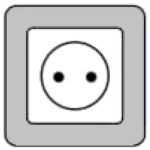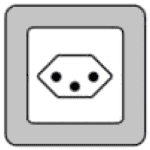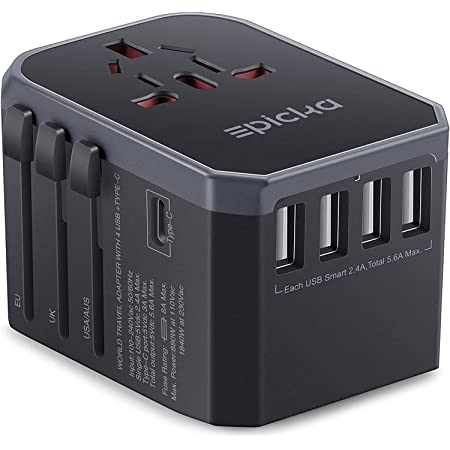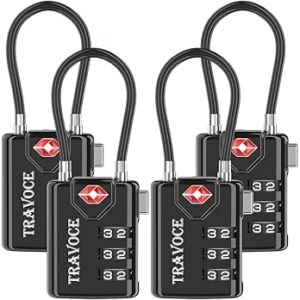Plug For Switzerland: What You Need To Know
What is the plug for Switzerland? Before you travel, check the information below to make sure your electronic devices are compatible with the outlet type and voltage.
Electrical Summary
Switzerland uses outlet types C, J at a voltage of 230V and a frequency of 50 Hz.
Plug Compatibility: Type C, Type J (SN SEV 1011:2009)
Voltage: 230V
Frequency: 50 Hz
Type C

Type J

Can North Americans use Electronics in Switzerland without an Adapter?
No! North Americans will need an adapter for the outlets and a transformer for the voltage when traveling to Switzerland. North Americans device plugs will not work with the outlet types in Switzerland. Also, the voltage in Switzerland is different from North American voltages.
Can Europeans use Electronics in Switzerland without an adapter?
Yes! Most Europeans do not need a travel adapter or transformer when traveling to Switzerland. Most device plugs will work with the outlet types in Switzerland. Also, the voltage in Switzerland is the same as in Europe.
What Outlet does Switzerland Use?
Type C

Type C plug sockets are used in Europe, Africa and Asia. They have two round pins and no grounding pin. These plugs are typically used with devices that have a voltage of 220-240V. This outlet is rated for 2.5 amps. Plug Type E, and Type F are compatible with this socket. All other plug types will need an adapter.
Type J

Type J plug sockets are used in Switzerland and Liechtenstein. They have three round pins and a grounding pin. These plugs are typically used with devices that have a voltage of 230V.
Recommended Products:
Should I use a VPN when traveling?
YES! Using a VPN when traveling is highly recommended to protect your online privacy and security. Public Wi-Fi networks in hotels, airports, and cafés are often unsecured, making you vulnerable to hackers and data theft. A VPN encrypts your internet connection, safeguarding sensitive information like passwords and banking details. It also allows you to bypass geo-restrictions, granting access to streaming services and websites that may be blocked in certain countries. Additionally, a VPN helps prevent government surveillance and ISP tracking. For a seamless and secure browsing experience while traveling, choose a reliable VPN with fast speeds and strong encryption.
Switzerland Travel Essentials:
Is it safe to drink water in Switzerland?
To be on the safe side, you can use common precautions such as boiling tap water for at least one minute, using water purification tablets, or drinking bottled water. It’s also important to note that ice may be made from tap water and that foods may be washed or prepared with tap water.
We recommend always packing a filtered water bottle when traveling!
Travel Essentials
Be sure to check our list of travel essentials before your trip!
Should I get travel insurance when traveling to Switzerland?
It is generally recommended to get travel insurance when traveling to a different country. Travel insurance can provide financial protection and peace of mind in case of unexpected events, such as medical emergencies, trip cancellations, lost or stolen baggage, or other travel-related mishaps.
Travel insurance can cover various expenses related to your trip, such as medical expenses, emergency medical transportation, trip cancellation or interruption, lost or stolen baggage or personal belongings, and other travel-related expenses.
Before purchasing travel insurance, it’s important to carefully review the policy details, including the coverage limits, exclusions, and any applicable deductibles or copays. You should also make sure that the policy covers any activities or destinations that you plan to participate in or visit during your trip. Click here to price Travel Insurance for Switzerland.
Frequently Asked Questions
Where is Switzerland located?
Switzerland is a landlocked country in Central Europe, bordered by Germany to the north, France to the west, Italy to the south, and Austria and Liechtenstein to the east. It is known for its picturesque Alpine landscapes, pristine lakes, and central location that makes it a hub for European travel and commerce.
What is the capital of Switzerland?
The capital of Switzerland is Bern, a charming city known for its medieval architecture, cobblestone streets, and UNESCO-listed Old Town. Although not the largest city in Switzerland, Bern serves as the political center, housing the Swiss federal government and parliament.
What languages are spoken in Switzerland?
Switzerland has four official languages: German, French, Italian, and Romansh. German is the most widely spoken, particularly in the central and northern regions. French is spoken in the west, Italian in the south, and Romansh, a lesser-known Romance language, is spoken in parts of southeastern Switzerland.
What currency is used in Switzerland?
The official currency of Switzerland is the Swiss Franc (CHF). Despite being located in Europe, Switzerland is not part of the Eurozone, although many businesses in tourist areas do accept euros. Credit cards are widely accepted, and ATMs are readily available across the country. Get great rates on currency transfers with Wise
What is Switzerland known for?
Switzerland is known for its stunning Alpine scenery, world-class ski resorts, luxury watches, Swiss chocolate, and neutral political stance. It is also famous for being a global financial center and home to international organizations such as the Red Cross and parts of the United Nations.
Is Switzerland safe to visit?
Yes, Switzerland is considered one of the safest countries in the world for travelers. It has low crime rates, excellent infrastructure, and a high standard of living. Whether you’re exploring cities like Zurich and Geneva or hiking in the Swiss Alps, visitors can expect a secure and welcoming environment.
How expensive is Switzerland?
Switzerland is often ranked as one of the most expensive countries in the world. Prices for accommodation, food, transportation, and attractions are typically higher than in neighboring countries. However, the high costs are matched by outstanding quality, cleanliness, and efficiency.
What is the weather like in Switzerland?
Switzerland has a temperate climate with four distinct seasons. Summers (June to August) are warm and ideal for hiking, while winters (December to February) bring heavy snowfall, perfect for skiing in the Alps. Spring and autumn offer mild temperatures and fewer crowds, making them great times to visit.
What are some famous places to visit in Switzerland?
Top tourist destinations in Switzerland include Zermatt and the Matterhorn, Interlaken, Lucerne, Lake Geneva, Jungfraujoch (the “Top of Europe”), and Zurich. Each offers a mix of natural beauty, outdoor adventure, and rich cultural experiences.
What food is Switzerland known for?
Switzerland is famous for its cheese and chocolate. Iconic dishes include fondue (melted cheese served with bread), raclette (melted cheese served with potatoes), Rösti (a crispy potato dish), and Swiss chocolate, which is celebrated globally for its quality and smoothness.
Travel Summary
Visitors to Switzerland can enjoy a range of outdoor activities, including skiing, snowboarding, hiking, and mountain biking in the Swiss Alps. The country is also home to several famous ski resorts such as Zermatt, St. Moritz, and Verbier. During the summer, Switzerland’s lakes and mountains offer opportunities for swimming, boating, and fishing.
In addition to its natural beauty, Switzerland is also known for its vibrant cities and cultural attractions. The city of Zurich, for example, is known for its charming old town, museums, and art galleries. The Swiss capital, Bern, is a UNESCO World Heritage Site with a picturesque medieval old town, while Geneva, home to many international organizations, offers a cosmopolitan atmosphere and stunning views of Lake Geneva.
Switzerland is also famous for its chocolate, cheese, and wine, and visitors can sample these delicacies at local shops and markets. The country’s cuisine is influenced by its neighbors, France, Germany, and Italy, and features a variety of dishes made with fresh ingredients, including rosti, raclette, and fondue.
Overall, Switzerland offers a unique travel experience with a mix of stunning alpine scenery, vibrant cities, and rich cultural heritage. Whether you’re looking for outdoor adventures or cultural attractions, Switzerland has something for everyone.
Traveling to another country? Check out our Countries page for more info on countries like the Austria, Germany, United Kingdom, France, Spain, Greece, and Portugal.





